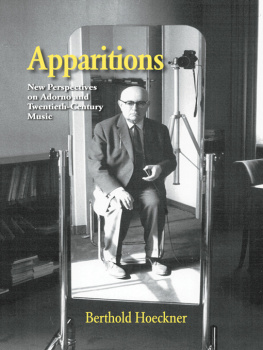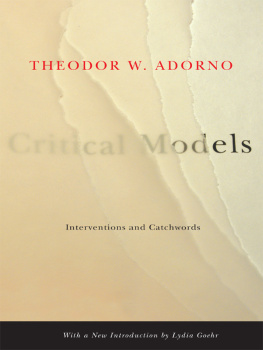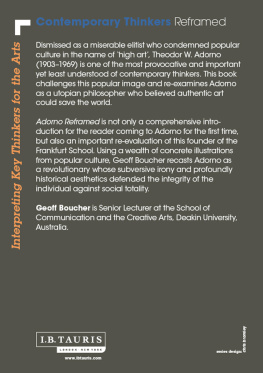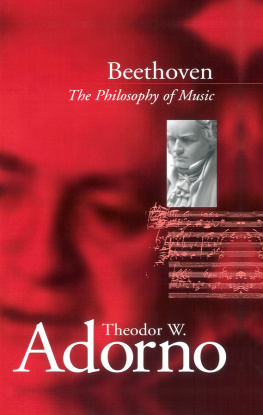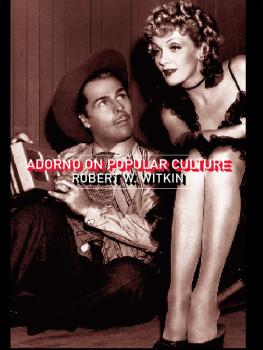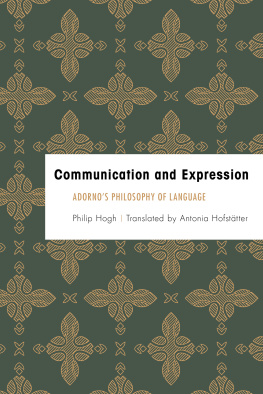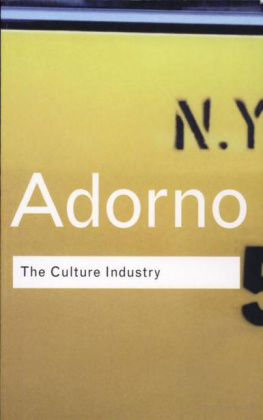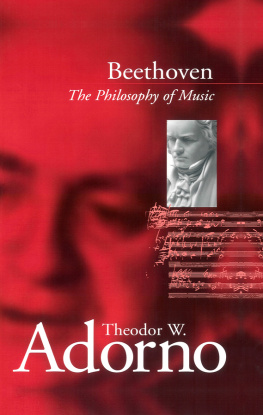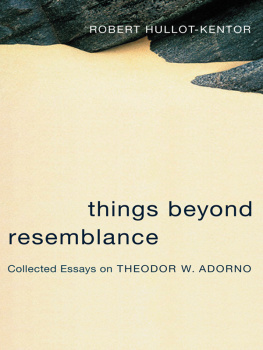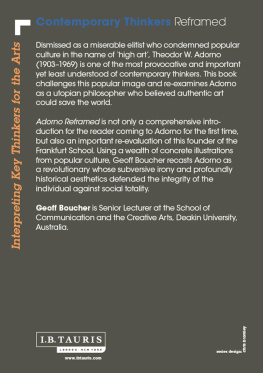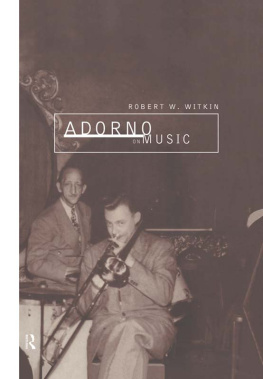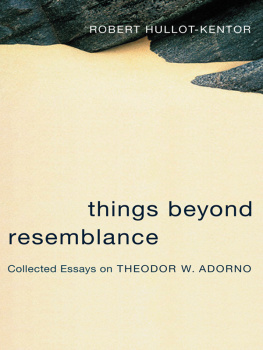Authors
Gianmario Borio is Professor of Musicology at the University of Pavia. He has published on the music of the twentieth century, the history of music aesthetics, and theory. In 199192, he was an Alexander von Humboldt Fellow at the University of Freiburg; in 1999, he received the Dent Medal from the Royal Musical Association. He is the author of Musikalische Avantgarde um 1960 (Laaber, 1993) and co-editor (with Hermann Danuser) of Im Zenit der Moderne: Die Internationalen Ferienkurse fr Neue Musik Darmstadt 19461966 (Freiburg, 1997).
James Buhler is Associate Professor of Music Theory at the University of Texas at Austin. He has written extensively on the music of Gustav Mahler, the musical writings of Theodor Adorno, and music and film sound. He is currently working on a book, Music and Sound in the Early Cinema .
Keith Chapin is Assistant Professor of Music at Fordham University. His research interests include the histories of music theory and aesthetics, and specifically the aesthetics of counterpoint from the eighteenth to the twentieth centuries. He is currently working on a book on counterpoint and the aesthetics of wonder in the eighteenth and early nineteenth centuries.
Daniel K. L. Chua is Reader in Music at Kings College London. He is the author of The Galitzin Quartets of Beethoven and Absolute Music and the Construction of Meaning , and is the recipient of the Royal Musical Association Dent Medal for 2004.
Berthold Hoeckner is Associate Professor of Music and the Humanities at the University of Chicago and recipient of the Einstein Award of the American Musicological Society. His book Programming the Absolute: Nineteenth-Century German Music and the Hermeneutics of the Moment was published by Princeton University Press in 2002.
Julian Johnson is Reader in Music at the University of Oxford, and Fellow of St Annes College. He is the author of Webern and the Transformation of Nature (CUP, 1999) and Who Needs Classical Music? (OUP, 2002) and has published widely on music aesthetics and issues in nineteenth- and twentieth-century music.
Larson Powell is Assistant Professor of German Studies at Texas A&M University. He has recently completed a book on twentieth-century German literature of nature ( The Technological Unconscious ), and is working on a second book on post-1945 media arts (electronic music, film, radio).
Martin Scherzinger is Assistant Professor of Music at Eastman School of Music. His publications have appeared in books and journals (including Music Analysis, Perspectives of New Music, Yearbook for Traditional Music, Cultural Critique , and the Journal of the American Musicological Society) . In 20023, he was awarded the Emerging Scholar Award by the Society for Music Theory, and he is currently in residence at the Princeton University Society of Fellows.
Alastair Williams is Reader in Music at Keele University, UK. He is the author of Constructing Musicology (Ashgate, 2001) and also wrote the chapter on modernism since 1975 for The Cambridge History of Twentieth-Century Music . In 2002, he was an Alexander von Humboldt Fellow at the Humboldt University, Berlin.
Drifting: The Dialectics of Adornos
Philosophy of New Music
DANIEL K. L. CHUA
The Philosophy of New Music is a message in a bottle. So locked within the fragile vessel of new music is a cry for salvation. And the task of philosophy is to rescue this bottle from total oblivion.
As an S.O.S, the philosophy of new music can no longer be an aesthetic philosophy; beauty is hardly relevant to the shipwrecked.
This means that there is no vantage point from which to philosophize; to drift is to lose all bearings. The only compass available is an internal dialectic within the historical material of new music that points to possibilities and tendencies but there are no fixed points. The result, as Adorno puts it in Minima Moralia , is micrological moral myopia;
Darkness also shrouds Adornos text. Its obscure dialectical maneuvers do not yield the kind of clarity demanded by modern reason. There is no immediate result. Rather it drifts, forcing a myopic tracking of its movements. Adornos dialectical struggle is a way of conscripting the reader on an odyssey of disaster in which our survival is not guaranteed only hoped for. But not everybody wants to embark on such a hazardous voyage. In fact, the immediate success of the book following its publication in 1949 registers its failure. The composers at Darmstadt who thought the Philosophy of New Music provided the theoretical and philosophical legitimation for their experiments with multiple serialism simply didnt get the drift.).
Table 1.1 Binary oppositions in Adornos Philosophy of New Music
| SCHOENBERG | STRAVINSKY |
| SOCIAL ATTITUDE |
| subjective | objective |
| individual | collective |
| ego | pre-ego |
| freedom | repression |
| victim | perpetrator |
| social critique | social conformity |
| outsider | insider |
| isolated | sociable |
| tragic | ironic |
| serious | witty |
| diagnostic | symptomatic |
| responsible | deceitful |
| progressive | regressive |
| COMPOSITIONAL TECHNIQUE |
| dynamic | static |
| temporal | spatial |
| dialectical | hierarchical |
| developing variations | block-juxtaposition |
| internal structure (idea) | external style |
| ORIGINS |
| spirit | body |
| voice | percussion (rhythm) |
| language | dance (ballet) |
| intentional | automatic reaction |
These oppositions flatten Adornos dialectics into a kind of cardboard politics where Schoenberg too easily triumphs over Stravinsky. In this reading, Schoenberg cannot fail, for he represents the individual subject, whose quest for freedom Adorno admires. So, like that subject, Schoenbergs music develops dynamically in time as it engages with the dialectics of history. Stravinsky, in contrast, represents the social object; his music is static, like juxtaposed blocks in space that impede the historical progress of humanity. Whereas Schoenberg reveals the expressive condition of the human spirit whose origin is in song, Stravinsky reflects the rhythmic mechanism of the social body that dances to the savage pounding of drums.
It is not that these contrasts are inherently untrue; it is just that they constitute the basis for a dialectical journey. A static reading of the text, in effect, nullifies the meaning of the book both as philosophy and as new music . As philosophy, truth, for Adorno, has to be figured in the tension of a dialectic that refuses to synthesize the truth, for the Hegelian definition truth is the whole ( Das Wahre ist das Ganze ) can only be a lie in an unreconciled world.Schoenberg essay that almost merges the dialectical Schoenberg with the nondialectical Stravinsky; their impossible synthesis is the negative truth of new music, which must be experienced as unresolved tension.
Thus there is something necessarily incomplete and provisional about this process; the tension creates a movement rather than an arrival; it is, after all, a message in a bottle and not a specimen behind a glass case. This means that the message in the Philosophy of New Music is subject to constant change, otherwise Adornos ideas would be irreconcilable with a [his] theory which holds that the core of truth is historical, rather than an unchanging constant to be set against the movement of history. The book is no more secure and no less fragile than a Flaschenpost tossing among the waves; and there is no telling which way the historical currents will flow and on what shores this bottle will land in the twenty-first century.

